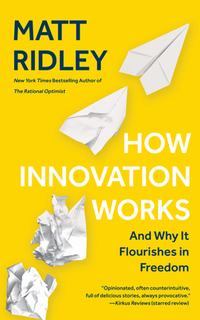So I recommend this book for two classes of people. One is innovators and would-be innovators themselves. If you’re an entrepreneur in Silicon Valley, Shanghai or Bangalore and you’re thinking about creating products—whether it’s social media, launching rockets, building airplanes or genetic engineering—you need to read this book because it will give you a better view of the history of innovation as well as the future of innovation than any other book that I know of. That context will be incredibly important when you’re trying to figure out things like: “Do I file patents? How important is the role of science? How important is the role of government? How long will it take for my innovation to be adopted? How much can I expect to sink into legal battles, vs. explaining things to people, vs. building the product?” So it’s a must-read for that category of people.
The other category that it’s very relevant for is government officials. Because to the extent that many of them pay lip service to the idea of building “the next Silicon Valley” or attracting entrepreneurship, they don’t know how. People ask me this all the time, and I give them basic, vague things like, “Yeah, you need to have some freedom, you need to have nice weather, you need to have a university system.” But this book has an actionable playbook near the end for how to foster that environment.
